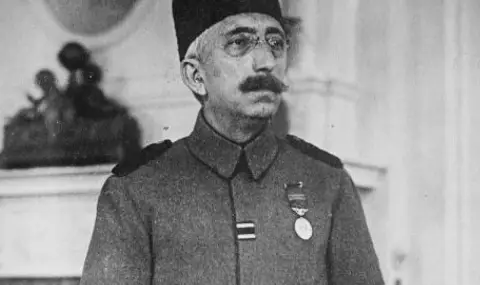Where does the 100th Caliph die? – In exile.
Where did the last 40th Sultan of the Ottoman Empire die? – In exile...
As you guessed, inquisitive reader of Fakti.bg, it is about the same person Mehmed VI.
On May 16, 1926, the exiled Mehmed VI died in the Italian city of San Remo. He was born in 1861 in Istanbul. He became Sultan on July 4, 1918, after Mehmed V's legal heir, Reshad Yusuf Izzetin, committed suicide.
The new sultan comes in difficult years for the empire, which began with the revolution of the Young Turks and ended with its defeat in the First World War. French and British troops occupied vast territories in the Middle East that had been held by the Sultan for centuries.
Under pressure from the West, Mehmed VI was forced to accept the Treaty of Sèvres. This is a peace treaty signed in the Paris suburb of Sèvres between the victors of the First World War and the Ottoman Empire. It was initialed on August 10, 1920 and is part of the Versailles treaty system.
On the side of the Ottoman Empire, it was accepted by Sultan Mehmet VI, who sought to retain his throne, but the Young Turk movement led by Kemal Atatürk rejected the treaty.
The main clauses in the treaty are territorial, military and legal.
The territorial clauses are related to the division of the Ottoman territories among the victors.
– France receives Lebanon and Syria, and Dulkadir and Cilicia remain under French influence.
– Italy received as zones of influence Tarsus, Antalya, Konya and parts of central Anatolia and received confirmation of the direct accession of the Dodecanese to its territories.
– Armenia receives Erzurum and the lands around Lake Van, along with the Trabzon region.
– Greece received Eastern Thrace, together with the Aegean islands and in the form of a zone of influence the area around Izmir. After the expiration of 5 years, a referendum was planned to be held in the region, which would determine whether the territory would become part of Greece or remain in the Ottoman Empire.
– Britain receives Palestine, Transjordan and Iraq, and parts of Kurdistan as a sphere of influence.
– The Bosporus and the Dardanelles have been demilitarized and handed over to International Control.
– The agreement also provides for a referendum among the Kurds to determine their future. The referendum was never held because of disagreements among the Kurds themselves.
The war clauses provided for the reduction of the Ottoman army to 50,000, allowed the retention of only 7 battleships and 3 torpedo boats, and prohibited the Ottoman Empire from having an air force. In addition, an allied control commission was created to monitor the implementation of the military clauses.
The general of the Ottoman army and hero of the defense of the Dardanelles – Mustafa Kemal Pasha retreats to the still free territories, rejects the power of the Sultan as exhausted and old-fashioned and announces his intention to save the country from the catastrophe in which it finds itself.
On November 1, 1922, after the Greek invasion of Asia Minor was repulsed, the Sultanate was officially dethroned, and on November 17, Mehmed VI left Istanbul aboard a British warship. At first he settled in Malta, but quickly moved to the Italian Riviera in San Remo.
